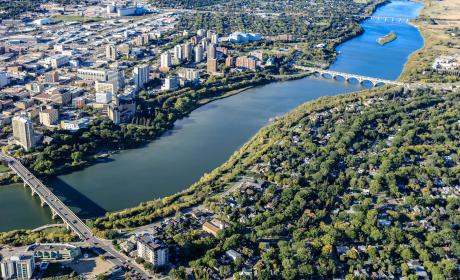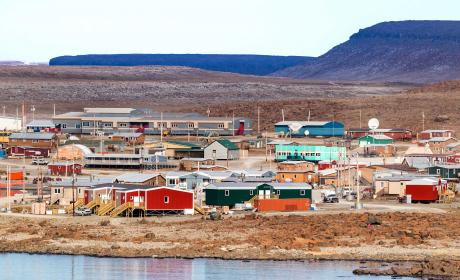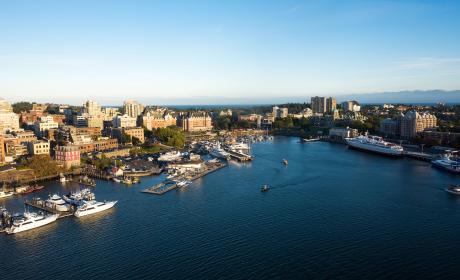The earth’s climate is changing and Canada’s municipalities are at the forefront of both the impacts and the opportunities to act. Supported by the Municipalities for Climate Innovation Program (MCIP), municipalities are meeting these challenges head on, building more resilient communities, reducing greenhouse gas emissions and adapting to climate-induced changes.
To date, MCIP has provided more than $50 million in funding to support over 320 local climate action projects, developed new training and resource materials to respond to specific challenges and provided coaching and training to local leaders. This report covers activities from April 2020 to March 2021.
YEAR 5 RESULTS
$57 million approved to support local climate action
$43 million has been distributed directly to municipalities
$7 million is supporting employment in smaller towns
186 (of 322) projects completed to date
555 (1,413 total) awareness raising and technical assistance events and activities delivered
4,136 (22,000+ total) individuals benefited from climate focused programming
299 hours (628 hours total) of coaching provided to local climate staff
34 (120+ total) training resources developed specifically for municipalities
385 (798 total) technical assistance activities by MCIP and MCIP partners
93 municipal leaders from 82 municipalities and regional districts across Canada participated in the Climate Leadership Course for Elected Officials
78% of course participants surveyed reported an increase in skills and knowledge at reducing GHG emissions
81% reported an increase in skills and knowledge of climate change adaptation
MCIP’s impact
Resilient communities
MCIP is a collection of success stories. One of its greatest achievements has been its ability to move the needle at the local level for the need to mitigate and adapt to climate change in all types of municipalities and sectors.
Thirty-five per cent of MCIP-supported municipalities with completed adaptation projects have created an adaptation plan, and three-quarters have started to implement it.
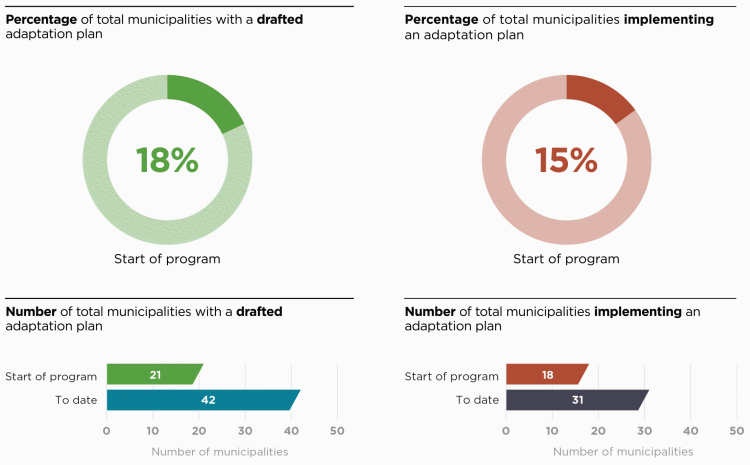
To date, 86% of MCIP-supported municipalities with completed mitigation projects have a GHG reduction plan approved by council in place, and more than half of those communities have started to implement it.
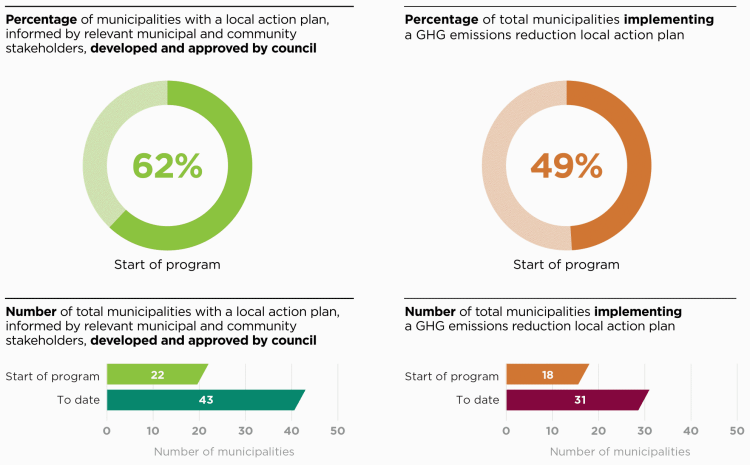
Through MCIP, municipalities have been able to explore risks and opportunities, and readied their communities with plans, staff and internal support to take much greater steps towards resiliency.
Climate impacts
MCIP is supporting the increasing number of municipalities that are making strong commitments to reduce GHG emissions over the short and long term.
Expected and committed GHG emission reductions from MCIP-funded projects:
|
977
Tonnes of expected GHG emissions reductions per year
|
Equivalent to 14,655 tree seedlings grown for 10 years
|
|
*These results derive from 7 municipal capital projects completed to date. It is expected that 21 more climate change mitigation capital projects will be completed before the end of the program.
|
|
14,690
Tonnes in short term (2025-2030) GHG emissions reductions commitments
|
Equivalent to 220,357 tree seedlings grown for 10 years
|
|
*Results are from 11 municipal plans completed to date. It is expected that 32 more climate change mitigation plans will be completed before the end of the program.
|
Climate change adaptation
As a result of completed adaptation capital projects to date, 11 municipalities are collectively saving over $2 M annually in capital expenditures, maintenance and refurbishment costs, improvements that will help more Canadians withstand future extreme weather events.
|
When fully implemented:
1,657,142
Individuals protected from climate change impacts including extreme weather, extreme heat and flooding to date
|
Equivalent to 4% of the Canadian population
|
|
*These results derive from 9 municipal climate adaptation plans completed to date. It is expected that 33 more plans will be completed before the end of the program.
|
Leveraging MCIP resources
Before a shovel can go into the ground, municipalities need to assess, plan, study and pilot local solutions that feed into larger infrastructure projects. That takes time and money but investing in large-scale infrastructure projects that address the causes and impacts of climate change is often beyond the financial capacity of most municipalities. MCIP is helping to bridge that gap.
To date, 39 municipalities and three organizations have leveraged their MCIP-funded climate projects to access more than $189 M in additional federal, provincial, municipal, NGO and private sector funds. MCIP also built local climate resilience by offering municipalities of all sizes access to larger government resources, such as the Disaster Mitigation and Adaptation Fund (DMAF). Some examples are included below.

The City of Surrey, BC received DMAF funding of $76.6 M to develop its coastal flooding and ecosystem protection plans. |

Investing in Canada Infrastructure Program (ICIP) provided $12.7 M to the City of Windsor, ON to develop its Active Transportation Master Plan Study and a flood mitigation strategy. |

DMAF also provided $10.7 M towards the construction of and improvements to four infrastructure assets in the Town of Tecumseh, ON to reduce the impact of severe storms and flooding. |
The flow of MCIP funding: Adaptation
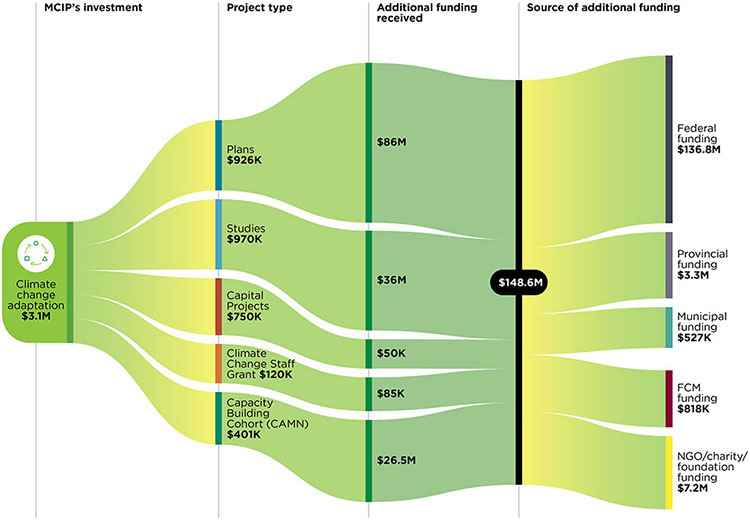
The flow of MCIP funding: GHG emissions reduction
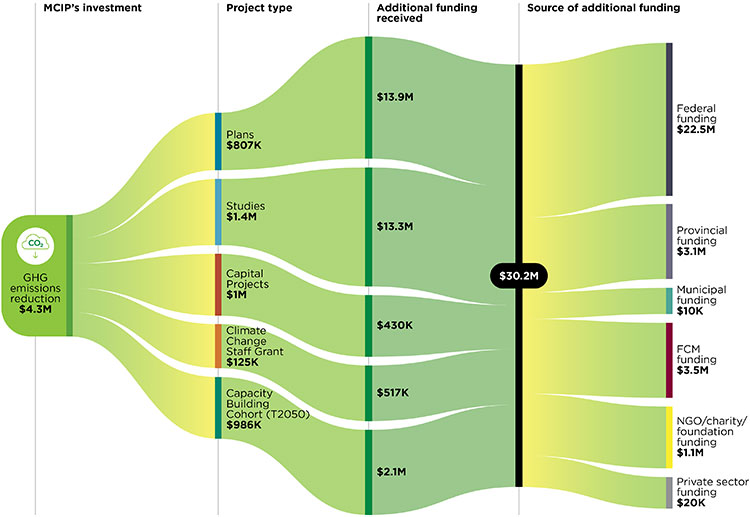
Supporting PCP members
Many MCIP-funded communities are also members of the Partners for Climate Protection (PCP) program, a partnership between the Federation of Canadian Municipalities and ICLEI Canada. With support from MCIP’s Regional Climate Advisors (RCA), 76 PCP member municipalities have committed to reducing GHG emissions by a total of 1,488,814 TCO2e by 2025/2030, the equivalent of almost 25 million tree seedlings grown for 10 years.
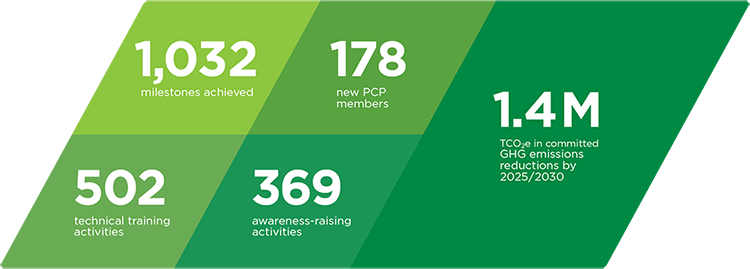
The MCIP network
MCIP has built a Canada-wide network of municipalities and organizations committed to climate action. This active capacity building network has worked together on grant-funded projects, communities of practice, peer-to-peer sharing and virtual events.
MCIP’s national network of over 30 training partners continues to support more than 550 municipalities and First Nations communities with expertise in deeply reducing GHG emissions and adapting to climate change. Through this network of national and regional organizations, MCIP has increased its reach to municipalities of all sizes across Canada.
Our partners deliver education and practical support for municipal staff and decision-makers, ensuring they have the skill set and tools necessary for planning and action.
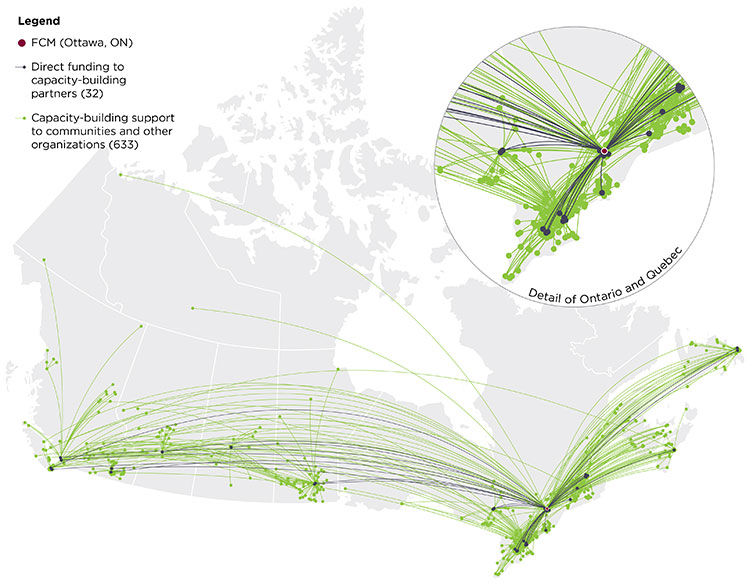
The impact of COVID-19
On March 11, 2020, the World Health Organization (WHO) declared COVID-19 a global pandemic. To ensure the safety of staff, partners and the communities where we work, FCM suspended international and domestic travel. To align with national and provincial restrictions, in-person program activities were swiftly transitioned to virtual platforms with only limited impact on planned Year 5 capacity building activities.
Due to some pandemic-related delays, Infrastructure Canada granted MCIP an additional year of program implementation to ensure that municipalities were able to complete their climate related activities. As a result, 67 MCIP-funded municipalities took advantage of the extension.
In spite of the many challenges that municipalities faced and continue to face as a result of the pandemic, MCIP grant recipients never lost sight of their goal to build more resilient communities. They continued their commitments to a green recovery at the local level and, in many cases, strengthened them.
